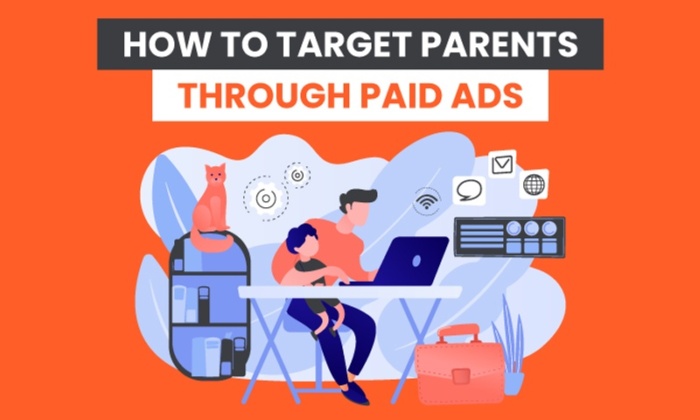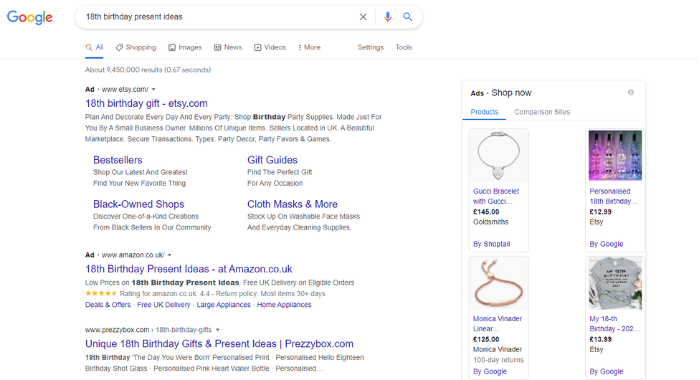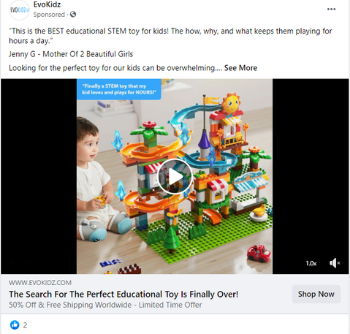
One of the tricky parts about this is the fact parents are such a varied group. Forty percent of US households have at least one child under the age of 18, and that large group includes people from all walks of life.
The USDA estimates that it costs $284,570 (with inflation factored in) to raise a child through age 17.
To successfully target parents through paid ads, you have to deeply understand your target audience and use this knowledge to inform your marketing strategy.
7 Ways to Target Parents Through Paid Ads
Parents spend a lot of time online, meaning they may be pretty likely to see your paid ads.
For the first time, women in the U.S. are more often having babies in their 30s than their 20s. This means you’re looking at an audience with a lot of millennials who spend a great deal of time on social media. This is also the case with younger parents, and both groups use search engines to find answers to everyday questions.
The difficulty is not reaching parents; it’s targeting the right people with the right message at the right time. For example, there’s no point in reaching a teenager’s parent with an ad for baby formula.
You may have a rough idea about your target audience, but you’ve got to drill down further and figure out what matters to parents when targeting them through paid ads.
1. Incorporate Life Events
When we look back at our childhoods or those of our children, it’s often the big life events that stand out. There’s nothing wrong with turning 31 or 63, but it doesn’t quite carry the same excitement as your eighth birthday.
Events like birthdays, holidays, vacations, and graduations are important to children, and they’re equally important to parents. Even if money tight, most parents are willing to do what it takes to ensure their children have amazing memories of big moments.
For marketers, this is an opportunity to connect with parents. It’s not always easy to know what kids want, but through paid ads, your business can guide parents to the hottest gifts.

This should play an important part in your paid ads, especially at important times of the year like late spring, when kids often graduate from high school. Parents often want to mark these special days with the right gift or by throwing a wonderful party, and your business should be looking to help make sure this happens via paid ads.
Paid advertising is about matching user intent, so make sure you know what products parents need.
2. Keep Your Audience’s Priorities as the Focus
What does your target audience look like, and what are its priorities?
Increasingly, parents are millennials. To target parents effectively, many brands have to understand how to target millennials.
Some key points that advertisers need to understand about millennials are generally:
- tech-savvy
- highly connected
- seeking immediate gratification
- caring about authenticity
- collaborative
These characteristics are further enhanced by the fact that parents are busy. They want to use technology to help solve problems, and when they buy products, they need the experience to be fast and effective.
This means the experience you offer parents with your ads has to be perfectly optimized. Modern parents won’t waste their time on poorly optimized mobile sites or those with checkouts that take too long.
Paid ads should be backed up by a good user experience. If you get this right, it allows you to focus on solving your target audience’s pain points. Although parents have diverse needs, these often can be broken down into three categories:
- saving time
- saving money
- doing things more effectively
If your website experience and products can come together to help parents achieve this, then you may find you have success with your paid ads.
3. Back Your Products with a Guarantee
Parents are usually fiercely protective of their children, and your products or services need to fit into this narrative.
When we buy products for ourselves, we make a complicated buying decision. When parents buy for their children, this is amplified. They want to know the products are safe, can benefit their children, and are going to last. If your products don’t demonstrate this, they’re not going to be as appealing for parents.
One of the ways you can help assure parents about your products is by offering a guarantee. If you believe in your products and services, you should be willing to offer assurances to your customers, and which you can state in your advertising.
In my article, “5 Simple Tips to Creating an Unbeatable Facebook Ad Campaign,” my first tip was “your offer will make or break your campaign,” and your guarantee is a part of this. Without the guarantee, your offer probably isn’t as appealing to parents.
Parents have to trust you and your products if they’re going to let your brand into their children’s lives.
4. Develop Trust
As I’ve mentioned, many parents are now Millennials who are very tech-savvy, connected, and collaborative. When it comes to making sales, this means you need to be able to create a brand people can trust. One of the most important aspects of this is social proof.
The stats behind online reviews are impressive:
- 93 percent of people read online reviews before buying a product.
- 91 percent of 18- to 34-year-olds trust online reviews as much as personal recommendations.
- Customers are likely to spend 31 percent more at a business with excellent reviews.
Reviews play a big part in modern consumer decisions, so you need to have a process in place to make sure you’re getting them. Once you do, you can use social proof to show parents that other parents have bought your product and had great experiences.
Parenting can be challenging, and there are many products out there that promise a lot but fail to deliver. Naturally, parents are eager to avoid such products, so a good review from a fellow parent can go a long way.

Of course, building this trust is based on you offering value for parents. If you’re doing this, you should take every opportunity to showcase it.
5. Be Informative
Children don’t come with a manual, and even if they did, following it would be nearly impossible. Naturally, parents look to authoritative sources to help them with their parenting—59 percent of parents say they have found useful parenting information on social media in the past 30 days. Your business may well be perfectly positioned to offer this information.
Targeting parents through paid ads doesn’t just have to be about your products. It can also make use of your knowledge.
Rather than just offering a quick solution to a problem, you can use your expertise to explain the reasons for the issue and offer advice.
For example, if a child struggles to organize their homework schedule, you can give parents tips about how to help their child become more organized rather than pushing your time-keeping app. You can naturally work your product into your resources, which begins to create a relationship with the reader.
Millennial consumers have grown up with internet marketing, and they’ve become skeptical about advertising. Using gimmicks doesn’t work with this demographic. It’s about offering value. The way you can do this is by showing your expertise and helping your target audience solve problems.
Your paid ads should have a collaborative feel to them, where you’re working together to make parenting easier, more affordable, and more effective.
6. Go Deeper With Your Targeting
What does a parent look like? It’s impossible to answer this question because they rarely look the same. There are so many different demographics within this audience:
- parents of newborns
- parents of teens
- first-time parents
- parents of multiple kids
- two-parent families
- single parents
- young parents
- older parents
The list is endless, and this is a good thing for marketers. If you can narrow down your target audience and understand who’s most likely to buy your products, you can target parents using relevant content.
For example, being a first-time mom is very different from doing it the second time around. First-time moms search for products in different ways than second-time moms, and they look for different things.
Through Google Ads, Facebook, Instagram, and other platforms, you can reach particular audiences. Make the most of this by working on your buyer personas.
7. Reach Parents When They’re Searching
Parents are exceptionally busy people. They’re often balancing bringing up a child with full-time employment and everything else that comes with life.
For example, due to work and daily schedules, parents may search for products late at night.
Understanding when parents search the internet can allow you to target them better and make your campaigns more effective.
Dig into your Google Analytics and find out when people are using your site and making purchases. Another great step is to ask parents about how they shop through surveys. People are often willing to answer quick questions, giving you great insights into how to target parents through paid ads.
Conclusion
It can be tricky to target parents through paid ads because they’re such a diverse group. Parents of teens are looking for very different things from parents of newborn babies, and your advertising needs to recognize this.
However, there’s one thing parents share: a desire to do the best for their children. To successfully advertise to parents, you need to understand how your business helps them with this.
By being there for parents on important days, guaranteeing your products’ safety, and helping them with high-value information, you could build relationships that bring in sales. The better you understand your target audience, the easier this should be.
Are parents a key demographic for your business? How do you reach them?
About us and this blog
We are a digital marketing company with a focus on helping our customers achieve great results across several key areas.
Request a free quote
We offer professional SEO services that help websites increase their organic search score drastically in order to compete for the highest rankings even when it comes to highly competitive keywords.
Subscribe to our newsletter!
More from our blog
See all postsRecent Posts
- Web Hosting September 26, 2023
- Affiliate Management September 26, 2023
- Online Presence Analysis September 26, 2023

